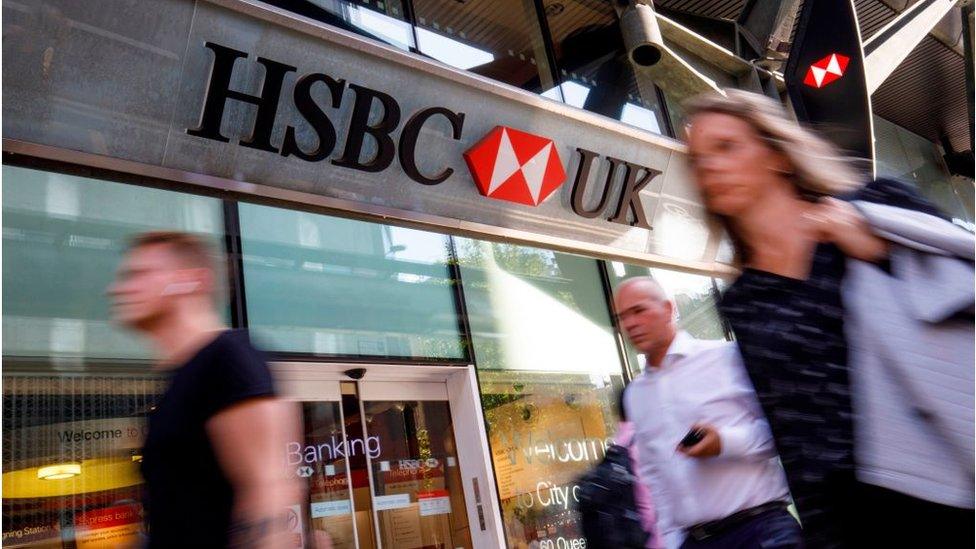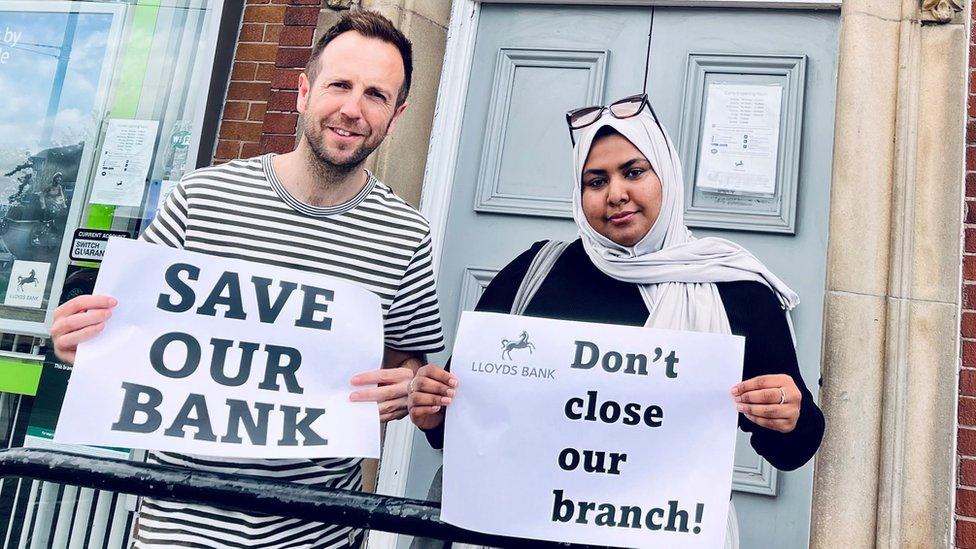HSBC to close 114 UK branches as more people bank online
- Published
- comments

HSBC says it will close 114 more branches in the UK from April, as customers using them have fallen significantly since the pandemic.
The bank said it would try to redeploy affected staff but about 100 will lose their jobs.
Banks have closed thousands of branches in recent years as more people bank online and lenders cut costs.
HSBC said it would invest in updating its remaining 327 branches, but a union accused it of abandoning customers.
"Without any corporate social responsibility to require banks to stay on our high streets to help the elderly, disabled or vulnerable, then access to cash and banking will be lost forever," said Dominic Hook, national officer at Unite.
Jackie Uhi, HSBC's managing director of UK distribution, said people were changing the way they bank and footfall in many branches was at an "all-time low, with no signs of it returning".
"Banking remotely is becoming the norm for the vast majority of us," she added.
She said the decision to close a branch was "never easy or taken lightly", especially if it was the last branch in an area.
She added that HSBC was investing in "post-closure" measures, such as providing free tablet devices to help some branch customers bank digitally.


While it is inevitable that branches are being shut, it is the speed of those closures that will cause concern.
Hundreds of branches are being axed every year. That is far faster rate than potential replacements can be opened to help those left struggling.
So-called shared banking hubs have been earmarked for 27 areas of the UK, with only two having opened their doors so far.
They allow local businesses and vulnerable residents who are customers of any bank to deposit and withdraw cash.
Although widely welcomed and supported, charities and consumer groups are calling for the project to speed up.

The latest closures come after HSBC said in March that it planned to shut 69 branches by this autumn.
It said footfall in three quarters of the branches set to close had halved over the past five years, a trend that had sped up since the pandemic.
Some HSBC branches serve fewer than 250 people per week, it added, while more than nine in 10 transactions at the bank are now done digitally.
The shift to online banking has seen High Street banks and building societies close more than 5,200 branches since 2015, according to the consumer group Which?, external. Of these:
Natwest, which owns RBS and Ulster Bank, has closed more than 1,200
Lloyds Banking Group, which owns Halifax and Bank of Scotland, has closed more than 850, with plans to close more than 70 more in 2023
Barclays is the individual bank that has shrunk the most, closing more than 960 branches.
It has left some communities without access to bank branches, while many cash machines have also shut.
The elderly and those without access to the internet have been disproportionately affected, as well as small businesses that bank in cash.
Tobias Gruber, chief executive of loan broker My Community Finance, said banks should use the money they save by closing branches to improve digital and telephone banking.
"It's unacceptable for bank customers to wait up to 30 minutes to speak to someone [by telephone] when it's their only choice because their local branch has vanished," he said.
Which? said HSBC's decision "risks further cutting adrift those who rely on cash", especially people using it to manage their finances during the cost of living squeeze.
Meanwhile, Age UK said tens of thousands of older bank customers "still rely on face-to-face banking".
"The rapid move towards digital banking over the past few years has caused huge problems for many older customers, who whether for health or personal reasons are not able to move online," said Caroline Abrahams, its charity director.
Which branches will close?
The HSBC branches that are set to close next year are:
In April: Abergavenny, Alton, Bexhill on Sea, Blandford Forum, Bristol Downend, Cromer, Leominster, Market Bosworth, Shaftesbury, St Austell, St Ives
In May: Arnold, Bideford, Brecon, Bridport, Brighouse, Bristol Filton, Coleraine, Didcot, Dover, Dundee, Fakenham, Gainsborough, Halesowen, Hove, Launceston, Leicester 11 Hinckley Road, Liskeard, Market Harborough, Minehead, Stamford, Stourport on Severn, Stroud, Sudbury, Waltham Cross, Whitby, Whitley Bay, Wilmslow
In June: Beccles, Bicester, Chepstow, Frome, Hertford, Honiton, Ilkley, Knutsford, Lewes, New Milton, Oakham, Penarth, Pocklington, Pontypool, Portadown, Ross on Wye, Skipton, Sleaford, South Shields, St Neots, Stirling, Twickenham, Wadebridge, Wells
In July: Blackwood, Bognor Regis, Bromborough, Christchurch, Coalville, Droitwich, Gosforth, Harpenden, Horsforth, Kingswinford, Leatherhead, Long Eaton, Marlow, Norwich Mile Cross, Palmers Green, Port Talbot, Portishead, Ripley, Seaford, Southampton Park Gate, Tonbridge, Wetherby
In August: Ashton under Lyne, Bethnal Green, Bristol Westbury on Trym, Cardiff Rhyd y Penau, Chippenham, Cirencester, Colwyn Bay, Denbigh, Dorchester, Eastwood, Henley on Thames, Hornchurch, Kenilworth, Leighton Buzzard, London 122 Finchley Road, Morley, North Finchley, Ormskirk, Putney, Reigate, Ryde, Windsor, Wymondham
Date to be confirmed: Cowbridge, Epworth, Holsworthy, Hythe, Oxted, Settle, Tenby
Related topics
- Published10 August 2022

- Published15 December 2021
